We wouldn’t dream of abandoning our vast semi–annual Most Anticipated Book Previews, but we thought a monthly reminder would be helpful (and give us a chance to note titles we missed the first time around). Here’s what we’re looking out for this month. Find more November titles at our Great Second-Half Preview, and let us know what you’re looking forward to in the comments!
NOVEMBER
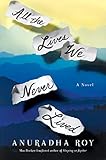 All the Lives We Never Lived by Anuradha Roy: This is Roy’s latest offering after a powerful showing in Sleeping on Jupiter, which was longlisted for the Man Booker prize in 2015. This novel centers around Myshkin, a boy whose life is changed when his mother elopes—no, vanishes—with a German man who appears naked at a river near their house one day and insists he has come for her after first meeting her in Bali. The novel follows the anamnesis of what happened, and his ruminations on its effect on his life. Already published in Britain, the novel has been called “elegiac,” compelling, and powerful, among other things. Conceived during a time Roy spent in Bali—at a festival where I had the pleasure of meeting her in 2015—this is an affecting novel. Readers should look for a conversation between Roy and me on this site around publication date. (Chigozie)
All the Lives We Never Lived by Anuradha Roy: This is Roy’s latest offering after a powerful showing in Sleeping on Jupiter, which was longlisted for the Man Booker prize in 2015. This novel centers around Myshkin, a boy whose life is changed when his mother elopes—no, vanishes—with a German man who appears naked at a river near their house one day and insists he has come for her after first meeting her in Bali. The novel follows the anamnesis of what happened, and his ruminations on its effect on his life. Already published in Britain, the novel has been called “elegiac,” compelling, and powerful, among other things. Conceived during a time Roy spent in Bali—at a festival where I had the pleasure of meeting her in 2015—this is an affecting novel. Readers should look for a conversation between Roy and me on this site around publication date. (Chigozie)
 Evening in Paradise by Lucia Berlin: Can you remember a better short story collection in recent years than Berlin’s A Manual for Cleaning Women? I can’t. Maybe once a week I think about that dentist, ripping his own teeth out in front of his granddaughter. Now, Berlin’s estate is back with even more stories, this time all previously uncompiled. In the case of a less talented writer, I’d be worried about publishers scraping the barrel. But with Berlin, there are surely unplucked molars. (Nick M.)
Evening in Paradise by Lucia Berlin: Can you remember a better short story collection in recent years than Berlin’s A Manual for Cleaning Women? I can’t. Maybe once a week I think about that dentist, ripping his own teeth out in front of his granddaughter. Now, Berlin’s estate is back with even more stories, this time all previously uncompiled. In the case of a less talented writer, I’d be worried about publishers scraping the barrel. But with Berlin, there are surely unplucked molars. (Nick M.)
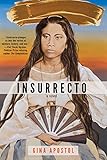 Insurrecto by Gina Apostol: A story that takes across time and place in the Philippines, from the American occupation to the Duterte era, by the winner of the PEN Open Book Award for Gun Dealer’s Daughter. Publishers Weekly calls the novel a “pyrotechnical marvel” and named it one of the best books of 2018. (And don’t miss Apostol’s astute essay in the Los Angeles Review of Books on Francine Prose and textual appropriation.) (Lydia)
Insurrecto by Gina Apostol: A story that takes across time and place in the Philippines, from the American occupation to the Duterte era, by the winner of the PEN Open Book Award for Gun Dealer’s Daughter. Publishers Weekly calls the novel a “pyrotechnical marvel” and named it one of the best books of 2018. (And don’t miss Apostol’s astute essay in the Los Angeles Review of Books on Francine Prose and textual appropriation.) (Lydia)
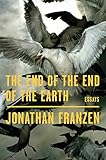 The End of the End of the Earth by Jonathan Franzen: Today Franzen is best known as a novelist—even a “Great American Novelist”—but it’s worth noting that he first appeared on many readers’ radar with his 1996 Harper’s essay “Perchance to Dream” about the difficulties of writing fiction in an age of images. Franzen’s essays, like his novels, can be a mixed bag, but he is a man perennially interested in interesting things that others overlook, such as, in this book, the global devastation of seabirds by predators and climate change. (Michael)
The End of the End of the Earth by Jonathan Franzen: Today Franzen is best known as a novelist—even a “Great American Novelist”—but it’s worth noting that he first appeared on many readers’ radar with his 1996 Harper’s essay “Perchance to Dream” about the difficulties of writing fiction in an age of images. Franzen’s essays, like his novels, can be a mixed bag, but he is a man perennially interested in interesting things that others overlook, such as, in this book, the global devastation of seabirds by predators and climate change. (Michael)
 My Sister, the Serial Killer by Oyinkan Braithwaite: As the title makes clear, the Nigerian writer Oyinkan Braithwaite’s first novel is a dark comedy of sibling rivalry. The beautiful Ayoola leads a charmed life, and thanks to the cleanup efforts of her older sister, Korede, she suffers no repercussions from killing a string of boyfriends. Korede’s loyalty is tested, however, when a man close to her heart asks out her sister. Film producers are already getting in on the fun, as Working Title has optioned what the publisher calls a “hand grenade of a novel.” (Matt)
My Sister, the Serial Killer by Oyinkan Braithwaite: As the title makes clear, the Nigerian writer Oyinkan Braithwaite’s first novel is a dark comedy of sibling rivalry. The beautiful Ayoola leads a charmed life, and thanks to the cleanup efforts of her older sister, Korede, she suffers no repercussions from killing a string of boyfriends. Korede’s loyalty is tested, however, when a man close to her heart asks out her sister. Film producers are already getting in on the fun, as Working Title has optioned what the publisher calls a “hand grenade of a novel.” (Matt)
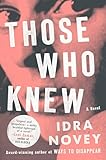 Those Who Knew by Idra Novey: Following up her debut novel, Ways to Disappear, Novey’s latest tells the story of a woman who suspects a senator’s hand in the death of a young woman on an unnamed island. The great Rebecca Traister says the book “speaks with uncommon prescience to the swirl around us. Novey writes, with acuity and depth, about questions of silence, power, and complicity. The universe she has created is imagined, and all too real.” (Lydia)
Those Who Knew by Idra Novey: Following up her debut novel, Ways to Disappear, Novey’s latest tells the story of a woman who suspects a senator’s hand in the death of a young woman on an unnamed island. The great Rebecca Traister says the book “speaks with uncommon prescience to the swirl around us. Novey writes, with acuity and depth, about questions of silence, power, and complicity. The universe she has created is imagined, and all too real.” (Lydia)
 Tell Them of Battles, Kings, and Elephants by Mathias Énard (translated by Charlotte Mandell): From the author of the brilliant, Prix Goncourt-winning Compass, a work of historical fiction that follows Michelangelo to the Ottoman Empire, where he is considering a commission from the Sultan to build a bridge across the Golden Horn. The novel promises to continue Énard’s deep, humanistic explorations of the historical and ongoing connections between Europe and Asia, Islamdom and Christendom. (Lydia)
Tell Them of Battles, Kings, and Elephants by Mathias Énard (translated by Charlotte Mandell): From the author of the brilliant, Prix Goncourt-winning Compass, a work of historical fiction that follows Michelangelo to the Ottoman Empire, where he is considering a commission from the Sultan to build a bridge across the Golden Horn. The novel promises to continue Énard’s deep, humanistic explorations of the historical and ongoing connections between Europe and Asia, Islamdom and Christendom. (Lydia)
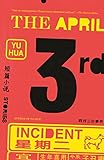 The April 3rd Incident by Yu Hua (translated by Allan H. Barr): A collection of his best early stories from a pioneer in China’s 1980 avant-garde literary movement, renowned for approaching realist subject matters through unconventional techniques. In his writings, reality is punctured and estranged, leading up to a new look at things familiar. Yu Hua is one of the best acclaimed contemporary Chinese authors. His previous works include China in Ten Words, Brothers, and the stunning To Live. (Jianan)
The April 3rd Incident by Yu Hua (translated by Allan H. Barr): A collection of his best early stories from a pioneer in China’s 1980 avant-garde literary movement, renowned for approaching realist subject matters through unconventional techniques. In his writings, reality is punctured and estranged, leading up to a new look at things familiar. Yu Hua is one of the best acclaimed contemporary Chinese authors. His previous works include China in Ten Words, Brothers, and the stunning To Live. (Jianan)
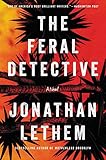 The Feral Detective by Jonathan Lethem: Charles Heist lives in a trailer in the desert outside L.A. and keeps his pet opossum in a desk drawer. Phoebe Siegler is a sarcastic motormouth looking for a friend’s missing daughter. Together, they explore California’s sun-blasted Inland Empire, searching for the girl among warring encampments of hippies and vagabonds living off the grid. In other words, we’re in Lethemland, where characters have implausible last names, genre tropes are turned inside out, and no detective is complete without a pet opossum.
The Feral Detective by Jonathan Lethem: Charles Heist lives in a trailer in the desert outside L.A. and keeps his pet opossum in a desk drawer. Phoebe Siegler is a sarcastic motormouth looking for a friend’s missing daughter. Together, they explore California’s sun-blasted Inland Empire, searching for the girl among warring encampments of hippies and vagabonds living off the grid. In other words, we’re in Lethemland, where characters have implausible last names, genre tropes are turned inside out, and no detective is complete without a pet opossum.
 The Patch by John McPhee: McPhee’s seventh collection of essays is finely curated, as expected for an essayist who lives and breathes structure. Essays on the sporting life fill the first part; the second includes shorter, previously uncollected pieces. The collection’s titular essay is an elegiac classic, which begins with the pursuit of chain pickerel in New Hampshire but soon becomes an essay about his dying father. McPhee flawlessly moves from gravity to levity, as in his writing about the Hershey chocolate factory. Such pieces are tastes of his willingness to let the world around him just be and to marvel at mysteries of all variety: “Pools and pools and pools of chocolate—fifty-thousand-pound, ninety-thousand-pound, Olympic-length pools of chocolate—in the conching rooms…Slip a little spatula in there and see how it tastes. Waxy? Claggy? Gritty? Mild? Taste it soft. That is the way to get the flavor.” One wishes John McPhee would write about everything, his words an introduction to all of life’s flavors. (Nick R.)
The Patch by John McPhee: McPhee’s seventh collection of essays is finely curated, as expected for an essayist who lives and breathes structure. Essays on the sporting life fill the first part; the second includes shorter, previously uncollected pieces. The collection’s titular essay is an elegiac classic, which begins with the pursuit of chain pickerel in New Hampshire but soon becomes an essay about his dying father. McPhee flawlessly moves from gravity to levity, as in his writing about the Hershey chocolate factory. Such pieces are tastes of his willingness to let the world around him just be and to marvel at mysteries of all variety: “Pools and pools and pools of chocolate—fifty-thousand-pound, ninety-thousand-pound, Olympic-length pools of chocolate—in the conching rooms…Slip a little spatula in there and see how it tastes. Waxy? Claggy? Gritty? Mild? Taste it soft. That is the way to get the flavor.” One wishes John McPhee would write about everything, his words an introduction to all of life’s flavors. (Nick R.)
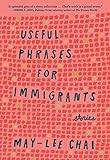 Useful Phrases for Immigrants by May-lee Chai: Winner of the Doris Bakwin Award selected by Tayari Jones, Chai’s collection comprises eight stories detailing life in a globalized world. Edward P. Jones called Useful Phrases “a splendid gem of a story collection…Complementing the vivid characters, the reader has the gift of language―‘a wind so treacherous it had its own name,’ ‘summer days stretched taffy slow’….Chai’s work is a grand event.” (Lydia)
Useful Phrases for Immigrants by May-lee Chai: Winner of the Doris Bakwin Award selected by Tayari Jones, Chai’s collection comprises eight stories detailing life in a globalized world. Edward P. Jones called Useful Phrases “a splendid gem of a story collection…Complementing the vivid characters, the reader has the gift of language―‘a wind so treacherous it had its own name,’ ‘summer days stretched taffy slow’….Chai’s work is a grand event.” (Lydia)
 A Stranger’s Pose by Emmanuel Iduma: From Cassava Republic Press, a new Nigerian publishing powerhouse that recently opened up a U.S. office, comes a collection of travel essays describing the New York-residing, Nigerian-born Iduma’s peregrinations through over twenty African cities (read an excerpt from the collection here at the site). “I want this book to occupy the space between home and disapora,” Iduma narrates in a lovely trailer for the book. The collection also features a foreword by Teju Cole. (Lydia)
A Stranger’s Pose by Emmanuel Iduma: From Cassava Republic Press, a new Nigerian publishing powerhouse that recently opened up a U.S. office, comes a collection of travel essays describing the New York-residing, Nigerian-born Iduma’s peregrinations through over twenty African cities (read an excerpt from the collection here at the site). “I want this book to occupy the space between home and disapora,” Iduma narrates in a lovely trailer for the book. The collection also features a foreword by Teju Cole. (Lydia)
 The Naked Woman by Armonía Somers (translated by Kit Maude): First published 50 years ago, this is Somers’ (1914–1994) first work translated into English. The novella follows one woman’s feminist awakening and the ways her transformation leads a rural village to ruin with violent desire. About the novel, Carmen Maria Machado wrote: “I am so grateful that a new generation will be able to read this surreal, nightmarish book about women’s struggle for autonomy—and how that struggle is (always, inevitably) met with violence.” (Carolyn)
The Naked Woman by Armonía Somers (translated by Kit Maude): First published 50 years ago, this is Somers’ (1914–1994) first work translated into English. The novella follows one woman’s feminist awakening and the ways her transformation leads a rural village to ruin with violent desire. About the novel, Carmen Maria Machado wrote: “I am so grateful that a new generation will be able to read this surreal, nightmarish book about women’s struggle for autonomy—and how that struggle is (always, inevitably) met with violence.” (Carolyn)
 Death and Other Holidays by Marci Vogel: Winner of the inaugural Miami Book Fair/de Groot Prize for Best Novella, Vogel’s debut follows April, the 27-year-old narrator, as she grieves her stepfather’s death over the course of one year. In a starred review, Kirkus called it “a moving and graceful novella of overcoming sorrow.” (Carolyn)
Death and Other Holidays by Marci Vogel: Winner of the inaugural Miami Book Fair/de Groot Prize for Best Novella, Vogel’s debut follows April, the 27-year-old narrator, as she grieves her stepfather’s death over the course of one year. In a starred review, Kirkus called it “a moving and graceful novella of overcoming sorrow.” (Carolyn)
 In/Half by Jasmin B. Frelih (translated by Jason Blake): First published in 2013 in Slovenian, Frelih’s debut novel won the 2016 European Union Prize for Literature. Set twenty-five years in the future, the experimental, post-modern novel follows three millennials as they navigate a crumbling world and attempt to find their place in an unrecognizable world. Publisher’s Weekly wrote the novel “sustains its ghostly, ethereal tone and will be appreciated by readers looking for a mind-bending puzzle.” (Carolyn)
In/Half by Jasmin B. Frelih (translated by Jason Blake): First published in 2013 in Slovenian, Frelih’s debut novel won the 2016 European Union Prize for Literature. Set twenty-five years in the future, the experimental, post-modern novel follows three millennials as they navigate a crumbling world and attempt to find their place in an unrecognizable world. Publisher’s Weekly wrote the novel “sustains its ghostly, ethereal tone and will be appreciated by readers looking for a mind-bending puzzle.” (Carolyn)
 Northwood by Maryse Meijer: A genre-bending novella written in short, formally-transgressive passages. Imbued with myths, fairy tales, and horror, the book follows a young woman who flees to the woods to pursue her artwork and what happens when she falls in love with a violent, married man. Samantha Hunt writes “Meijer has made her own form, something new and wide-open, something as blissful and broken as the language of lovesickness itself.” (Carolyn)
Northwood by Maryse Meijer: A genre-bending novella written in short, formally-transgressive passages. Imbued with myths, fairy tales, and horror, the book follows a young woman who flees to the woods to pursue her artwork and what happens when she falls in love with a violent, married man. Samantha Hunt writes “Meijer has made her own form, something new and wide-open, something as blissful and broken as the language of lovesickness itself.” (Carolyn)








